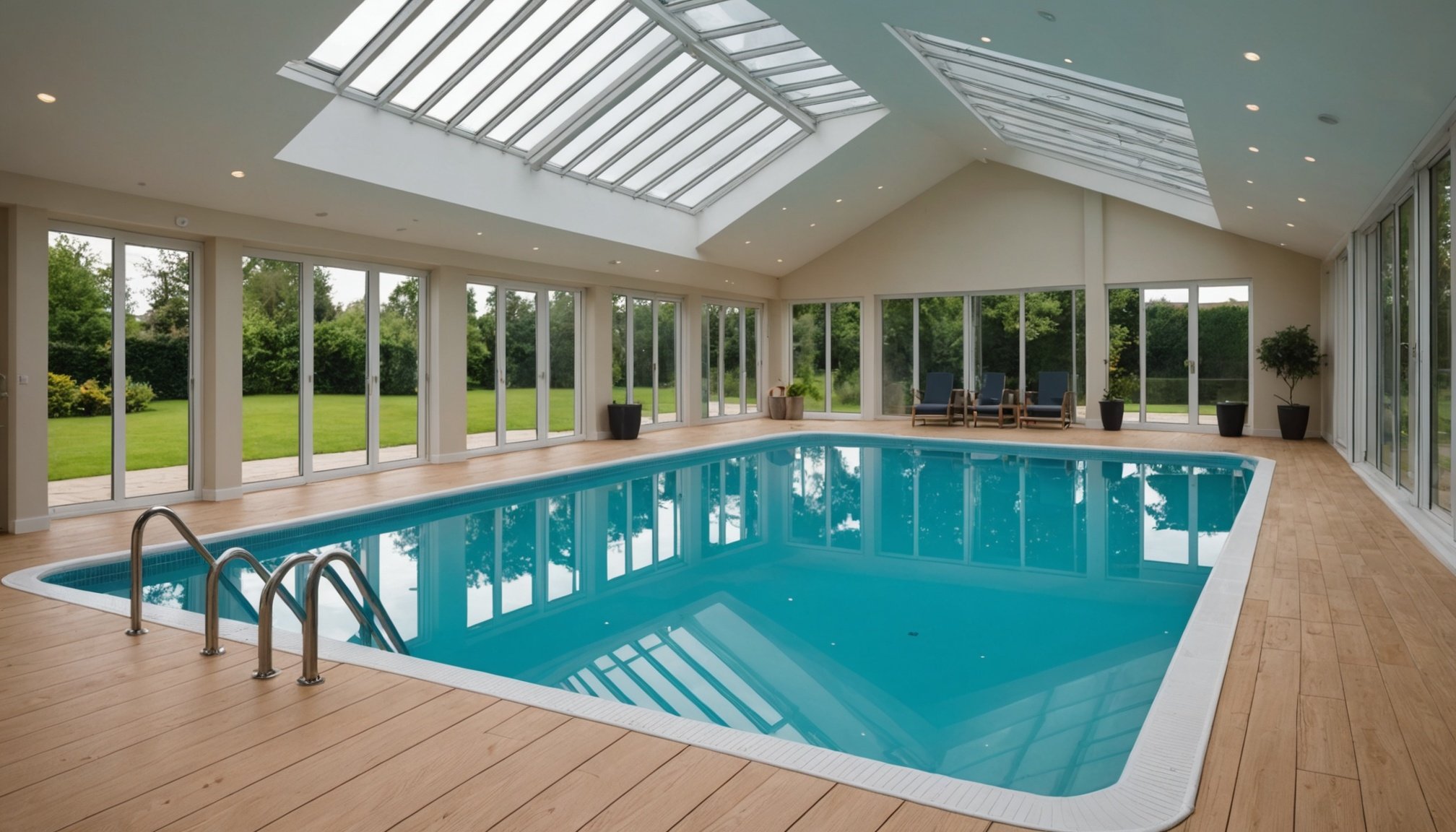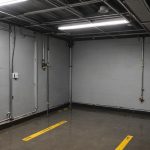Overview of Energy-Saving Heating Solutions
Energy-efficient heating systems are pivotal for maintaining an indoor pool comfortably while minimising operating costs. Achieving an optimal balance between warmth and cost-effectiveness, these systems ensure pools remain sustainable and accessible year-long.
Types of Energy-Efficient Heating Systems
The UK offers a variety of indoor pool heating solutions designed to be both economical and eco-friendly:
Dans le meme genre : Boost Your UK Pool Safety with Innovative Smart Technology Solutions
-
Heat Pumps: Utilising ambient air, these systems convert thermal energy into heat, providing a consistent and efficient method to maintain desired temperatures.
-
Solar Heating: Harnessing solar panels, this solution captures and converts sunlight into a cost-effective pool heating option that significantly reduces energy bills.
Sujet a lire : Transforming Your UK Garden: Creative Ideas for Seamless Pool Cover Designs That Harmonize with Nature
-
Gas Heaters: While traditionally more energy-consuming, modern advancements have made gas heaters more energy-efficient by incorporating condensing technology.
-
Electric Resistance Heaters: Although energy-intensive, these are often paired with renewable energy sources to improve cost-effectiveness.
Benefits of Opting for Energy-Saving Solutions
Selecting an energy-efficient heating system can lead to substantial reductions in energy consumption and operational costs. For pool owners, the benefits include not only financial savings but also a more sustainable carbon footprint. Such systems offer peace of mind, knowing that one’s investment is adhering to both economic and environmental best practices.
Heat Pumps for Indoor Pools
When it comes to maintaining a comfortable pool temperature, heat pumps offer an efficient and environmentally friendly solution. Unlike traditional heating methods, heat pumps harness energy from the surrounding air to warm the pool water, which can be a cost-effective and sustainable choice.
How Do Heat Pumps Work?
Heat pumps operate by extracting heat from the air and transferring it to the water. This process requires less energy compared to combustion-based heaters. As a result, heat pumps can achieve efficient heating with reduced energy consumption. Typically, they are more suited to moderate climates, as their performance can decrease in extremely cold conditions.
Cost and Maintenance
While the initial installation costs of heat pumps may be higher than conventional heaters, their operational efficiency often leads to energy savings over time. Additionally, their maintenance is relatively straightforward, involving regular checks to ensure components are functioning correctly. With a lifespan that can extend up to 15 years, they are a sound investment.
Environmental Impact and Energy Savings
Beyond efficiency, heat pumps contribute significantly to lowering carbon emissions. By relying less on fossil fuels, they reduce the environmental impact of pool heating. Over time, the reduction in energy usage not only benefits the environment but also results in noticeable savings on utility bills.
Solar Heating Solutions
Harnessing the power of the sun, solar pool heating presents a remarkable innovation within renewable energy solutions. As an eco-friendly heating technique, it seamlessly integrates with your existing heating system, offering a sustainable way to maintain an optimal pool temperature.
Overview of Solar Heating Systems
Solar heating systems utilize solar collectors, typically mounted on rooftops or nearby structures, to capture sunlight and convert it into thermal energy. This energy is then used to heat water, which circulates through your pool. The result? Reduced reliance on conventional heating methods and a substantial decrease in energy costs.
Key Considerations for Installation
When planning for solar pool heating, several factors warrant careful examination:
- Roof Space: Ample space is necessary to accommodate solar collectors effectively. A lack of sufficient surface area may impede system efficiency.
- Sunlight Exposure: Consider the orientation and shading of your prospective solar panel location. Optimal sunlight exposure is crucial for maximizing energy absorption and efficiency.
Successful Implementations in the UK
In the UK, numerous success stories demonstrate the viability of solar heating. Homeowners have found that strategic placement of collectors and effective management of sunlight exposure significantly enhance heating efficiency, proving solar heating to be an invaluable complement to existing systems.
Pool Covers and Their Benefits
Pool covers serve as an effective solution for maintaining optimal energy conservation. By significantly reducing heat loss, pool covers help in retaining heat, thus minimizing energy costs associated with reheating the water. This is achieved through barriers that provide insulation, maintaining the pool’s warmth.
Types of Pool Covers
There are several types of pool covers, each offering varying levels of heat retention and energy efficiency. Solar covers, for instance, use the sun’s rays to naturally heat pool water while preventing heat escape. Automatic covers provide convenience and a tighter seal, offering superior energy conservation by ensuring consistent coverage. Mesh covers primarily keep debris out but can also help with reducing evaporation.
Additional Benefits
Using a pool cover not only aids in energy conservation but also reduces evaporation, saving water. They also keep leaves and dirt out, reducing cleaning efforts and maintaining cleaner water quality.
Selecting the Right Cover
Choosing the right pool cover depends on factors like pool size, climate, and usage. For frequent swimmers, an automatic cover might offer the best balance of convenience and energy conservation. For those in sunny regions, solar covers could be most beneficial. Evaluating these factors will lead to a more effective and practical choice.
Cost Comparisons and Long-Term Savings
When considering different heating solutions, you’re likely interested in a solid cost analysis to identify the best value. Initially, traditional systems may seem cheaper, but let’s delve deeper. An up-front installation cost comparison often reveals that energy-efficient systems can be higher. However, factor in ongoing energy savings and a different picture emerges.
For instance, while a standard boiler might appear cost-effective initially, modern heat pumps generally lower your electricity bills over time, thanks to their significant energy savings. Calculating the payback period involves comparing these operational costs over several years. By doing so, you can see that the latter’s efficiency effectively narrows the cost gap, with many systems providing payback within six to ten years, depending on local energy tariffs.
Moreover, the UK government offers various incentives which are worth considering. Schemes such as the Boiler Upgrade Scheme or the Renewable Heat Incentive can alleviate upfront costs, further improving the affordability and attractiveness of these energy-efficient options. Thus, coupling these incentives with potential energy savings not only promotes a sustainable choice but also ensures long-term financial benefits.
User Reviews and Brand Recommendations
Exploring user testimonials sheds light on diverse experiences with heating solutions among UK pool owners. Many users have found significant success with specific models that offer consistent performance. Top brands like Hayward, Pentair, and Intex often receive high praise for their reliability and efficiency. These manufacturers consistently rank well for delivering durable and effective heating systems.
Most users recommend considering warranty and customer service when selecting a heating system. Effective customer service can be crucial, especially when encountering technical issues. Brands known for excellent support are more likely to leave customers satisfied with their investment. Always check the fine print on warranties to ensure comprehensive coverage.
Brands like Hayward and Pentair have built reputations based on expert evaluations and have garnered positive feedback for their user-friendly designs and robust performance. Intex, known for affordability, offers satisfactory results for smaller pools.
Selecting reputable brands based on user feedback ensures not only efficient heating but also long-term peace of mind. Consider these valuable insights when exploring heating solution options to make informed decisions tailored to your pool’s needs.
Regulatory Considerations in the UK
Navigating the world of UK regulations for indoor pool heating systems is crucial for pool owners. Ensuring compliance can save both time and money. At the heart of these regulations are energy efficiency standards and building guidelines designed to promote sustainable practices.
One major aspect of these regulations is the Energy Performance of Buildings Directive (EPBD), which mandates energy performance evaluations. Compliance with these standards not only helps the environment by reducing energy waste but also lowers utility costs in the long run. Non-compliance, however, can lead to penalties, making it essential to stay informed.
Building Regulations Part L focus on the conservation of fuel and power, ensuring that new building projects meet specific energy performance criteria. These guidelines have a direct impact on the installation and maintenance of indoor pool heating systems, emphasizing the importance of energy-saving measures.
To aid pool owners, several resources are available. These include government websites, local council offices, and industry professional associations. By utilising these resources, pool owners can stay informed and ensure their heating solutions align with all legal requirements, fostering both efficiency and compliance.











